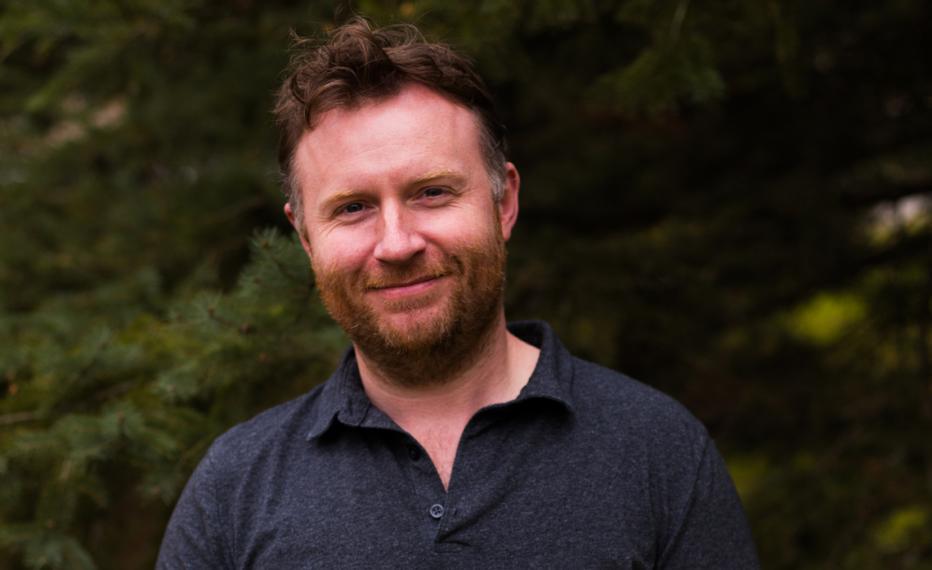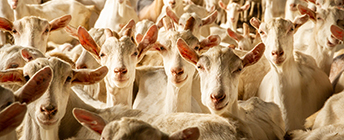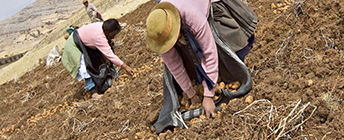Q&A with a social enterprise development coordinator

Tom Armitage (B.Sc. (Agr.) in Organic Agriculture, 2013) is a lifelong learner and advocate for local food security. He works as the Social Enterprise Development Coordinator at The SEED, a not-for-profit food project at the Guelph Community Health Centre. We recently chatted with him about his role and the importance of providing accessible food to the community.
Tell us about The SEED.
In general, The SEED exists because food insecurity exists in Guelph and Wellington County. Many of the interventions that have existed over the last few decades have not fully resolved the issue of food insecurity. A lot of meaningful work has taken place and many social assistance programs exist, but there are always gaps. The SEED believes that social enterprise is something that can fill one of those gaps. We also believe that it can increase the access to healthy food by reducing the costs to certain people, while including everyone in the solution. Our approach is through open access – if you’ve indicated you have a need and we will support you where we can. Some of our programs include Community Food Markets, Upcycle Kitchen and the Good Food Warehouse.
What is a social enterprise?
Social enterprise is the use of business principles to achieve a social and/or environmental benefit. The goal of a social enterprise is not to seek profit, but to use the sale of goods and/or services to improve the conditions for something or someone. By acquiring revenue through business activities, a social enterprise has the discretion how best to make use of that income, typically by reinvesting in the business through its participants (e.g. paying fair wages) or by acquiring capital (e.g. a vehicle to transport more goods) where the investments get the enterprise closer to achieving its social/environmental outcomes. A social enterprise can be non-profit or for profit in structure, but when structured as a for profit the social/environmental outcomes are put ahead of profits, where income is again simply used as a means to an end.
Tell us about your role.
I develop enterprises that fill different gaps in the community. I conceptualize the programs, build business cases, launch pilot programs, manage budgets and operations, and evaluate and adapt them based on community feedback.
Why is food security so important to you?
In a previous job managing a local urban agricultural company, I noticed that the people who were accessing our food, were often middle- and high-income folks. We were unable to provide food to the people facing food insecurity. It seemed unfair – not just that the program could not do it, but that there is an inequitable access to food across society. So that is what prompted me to study more, I started asking myself, “what could those interventions look like?”
I think food access is inequitable and I’ve always wanted to do something with my work-life that benefits society. That’s one of the reasons I studied agriculture. If you produce food your contributing good value towards society.
What is the most rewarding part of your job?
We always evaluate our programs after launching them. We do this not to prove the fact that we are doing well, but to improve the work that we do. We find that people overwhelmingly have positive things to say about our programs. We spend significant time devising a strategy, operationalizing, piloting and revising. When we receive a bunch of positive feedback that the program is benefiting the community in multiple ways, it is very rewarding. It is also rewarding to know that you can pose those questions about your work in a safe space and that criticism is welcome and we’re not just going to shelve that criticism.
Why did you choose U of G?
I took a break after finishing a college program right out of high school, knowing this wouldn’t be my path. I wanted to dip my toes in a few different things and see where that would take me.
When I was younger, I spent some time on my grandmother’s farm and I really enjoyed being outside and enjoyed the physical labour. When I was thinking about opportunities, I thought, “what about agriculture,”. I took intro to organic agriculture courses through the Nova Scotia Agricultural College (now a part of Dalhousie’s Department of Agriculture) and loved it, so I decided to pursue their certificate program in organic agriculture.
I wanted to get more hands-on work in this field, so I did an internship with a transition to organic farm in Nova Scotia, in 2009. I really enjoyed that experience and learned a lot about small scale market garden production. I felt really inclined at the time to do a full degree in agriculture. I enjoyed the science aspect from Nova Scotia and wanted to pursue it further, so I enrolled in a degree in organic agriculture in 2010.
What was it about organic agriculture that interested you?
As a consumer, I felt I didn’t really know what organic was. From a knowledge perspective I thought if I studied organic agriculture, I would also learn about conventional agriculture at the same time. So I went the organic route to learn about both. I also really appreciated the values organic agriculture had embedded within it, there is a lot of merit in the practices within organic agriculture and I wanted to learn about it more.
How was your experience as a mature student?
I was 28 when I started, and it didn’t make too much of a difference. My student life was still good, I was still involved in a lot of things and never felt out of place. My study habits would have been a lot different at 18 or 19. I am glad I gave myself that time. I was determined to do well and really applied myself.
What do partnerships with U of G and The SEED look like?
It’s a bit of a mix, but it usually starts with us posing questions. We often work with the Community Engaged Scholarship Institute (CESI) for various things. When we are working with CESI we get connected with course based students, often paired with graduate level courses. Any time we are looking for a more rapid turnaround or something more suited to the research shop, we will we will work with them to do needs assessments, surveys or just research about what interventions exist out there that we might want to apply.
Often, we will be approached by students or researchers for other types of projects. We’ve also partnered with the Arrell Food institute for different projects.
How we can all support food security in our communities?
We can all support the alleviation of food insecurity in our communities by engaging in activities that bring attention to the issue. We all have a voice and if we can encourage our representatives to vote for/create policies that bring back greater social safety nets we'd see the issue decrease considerably. Food insecurity is predominately an income-based issue, so if we can find ways to advocate for systemic change (e.g. basic incomes, living wages, better health coverage for people who are unemployed, etc.) we could see positive change happen and the problem significantly reduced. System change takes time, however, so while those efforts are ongoing we can support programs and local interventions that are filling in the gaps, particularly those that offer programs and services that increase access to nutritious food in a dignified way while also challenging the status-quo rather than seeking to entrench themselves while accepting their role in a broken system.
This article was originally published in the LIBRANNI 2021 / Vol. 3
What happened to this degree? The organic agriculture major was replaced with a Certificate in Organic Agriculture. Now all U of G students interested in organic and sustainable agriculture have the option to pursue their interests through a certificate.
 |
Read more:Milking a "Ridiculous" idea
|
 |
Read more:Research with international impact |